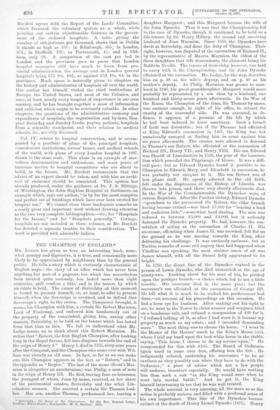HOSPITALS AND ASYLUMS OF THE WORLD.* THE completed publication of
this important work marks an era in the history of hospital literature. Mr. Burdett has had more than a quarter-of-a-century's practical experience of the administration of hospitals and kindred institutions, and has spent many years in arranging the enormous mass of information he has collected. Both he and his readers are to be congratulated on the happy attainment of his task. To students of hospital management and economy, this book will be a necessity ; architects emulous of hospital construction will find it simply invaluable ; whilst the lay reader who is not deterred by its massive dimensions and professional title and appearance, will find ample reward for his courage. Nor should this be surprising. We are all liable to accident and disease, and stand in jeopardy every hour; whilst as to insanity, three in every thousand are affected by it, and how often have we to deplore that "a young maid's wits should be as mortal as an old man's life " ? Hence, the wealth of information to be found in these pages concerning the combined efforts made to combat these evils, apart from what is understood as medical and surgical skill, cannot fail to attract our attention and rouse our sympathy.
The first two volumes relate to asylums, or, as Mr. Burdett would prefer to call them, " Hospitals for the Insane,"—a term implying hope of recovery rather than the idea of con- finement and restraint. Of the early history and treatment of insanity, our information is meagre ; but all that is known tends to show that the ancients were acquainted with assem- blages of lunatics, and felt the importance of a special type of habitation for them, and treated them in a rational and kindly manner. " In a word, they were almost as advanced in the first century with regard to diagnosis, and possibly farther advanced with regard to treatment, than were we only a few years ago, after eighteen hundred years' study." The period of humanity continued up to A.D. 600, when the idea of demoniacal possession became very strongly developed, and insanity and witchcraft were placed in the same category, and treated With the same horrible and revolting cruelty. Thousands of unhappy maniacs were burnt at the stake—in one hundred years, twenty thousand suffered in France alone—and during the Middle Ages the same thing went on all over Europe, and continued up to 1760. Then commenced the period of brutal suppression and ill-treatment, from which mankind has only quite recently emerged. From time to time a few hospitals were established. In 1370, the first Christian hospital was provided, near the Tower of London, by Robert Denton, a priest, which is now known as St. Katherine's Hospital, Regent's Park. Bethlem, founded in 1247, was set apart for lunatics about 1400 ; whilst during the fourteenth and succeeding centuries, hospitals for the insane were established in different cities of Europe. But until the early part of the current century, asylums were the exception ; in many of these, patients were abused with hideous barbarity until quite lately. Even in 1870, the Liverpool Lunatic Hospital was abominably con- ducted. To the St ciety of Friends belongs the honour of leading the way to better things. The establishment at York of the Friends' Retreat—a name happily suggestive of quiet and soothing treatment—" constitutes in the history of insanity a landmark which can never be eliminated." William Take, who introduced this intelligent system, was happy in getting attendants of the right stamp. It need hardly be urged how all-important a condition this is in the manage- ment of the insane, nor how difficult it is of attainment. It * Hospitals and Asylum, of the World. By Henry O. Burdett. 4 vols. and Portfolio. Vole. I. and IL, 1891; Vols. III. and IV., with Portfolio, 1893. London: 3. and A. Churchill. seems almost impossible to find the right material out of which to make good attendants; but Mr. Burdett admits that a modern system of training has not, with a very few marked exceptions, been attempted, and it is the United States that can claim the first complete training-school. The chapter on this subject is well worth perusal.
Our author next reviews the present condition of asylums, and it is satisfactory to learn that the British County Asylums are "institutions of which the nation may well feel proud." They are most efficiently conducted. So desirable is the lot of an insane over that of a sane pauper, that it is believed that imbecility is feigned among paupers and their friends, in order to get into county asylums. But for lower- class patients at moderate rates, there is great want of accom- modation,—a state of things urgently requiring remedy. County asylums tend to grow unwieldy. The extreme limit is placed by our author at 1,000 beds. The largest asylum contains about 2,300 beds ; the smallest, 280. The cost per patient, which averages 8s. 7d. per week, exclusive of building- charges, is naturally less in large establishments. Mr. Bardett deals very fully with the question of management and administration. He also reviews exhaustively the system prevailing in different lands. In America, overcrowding,— an evil of the first magnitude," is terribly prevalent. On the Continent, Austria leads the van in point of excellence, France and Germany coming next. In Italy, pellegra, the form of leprosy caused by the use of adulterated maize, so common among the poor, is usually followed by insanity; in fact, it is the end of all bad cases. Pellegra is the curse of the land ; and we learn that in 1879 a third of the population of Italy was suffering from this disease. The insane there, as in Portugal, are treated with cruelty and harshness. The Northern nations, Mr. Burdett tells us, pay too little attention to occupation and amusement ; but improvements are taking place, especially in Russia, whose institutions "axe on the whole in a satisfactory condition." A perusal of the con- cise statement given of lunacy legislation shows that England leads the way among the few nations that have attempted to enforce the legal regulations of lunatics and asylums.
Vol. II. deals with asylum construction. The whole ques- tion is most thoroughly discussed, and a number of plans are given of existing asylums, and these are compared and criticised. Mr. Burdett holds that, before a new hospital for the insane is built, the medical superintendent should first be appointed, and should be charged with the duty of advising on the plans. This would avoid much subsequent expense in alterations and additions, which are otherwise almost certain to be found necessary.
Turning to Vols. III. and IV., we find them devoted to the consideration of hospitals for the treatment of accident and disease, both general and special, following generally the same lines as Vols. I. and II. The history of medicine loses itself in dim antiquity, but "the definite history of hospitals does not go beyond a comparatively recent period." Monasteries were among the first hospitals, and in Roman Catholic countries the task of nursing the sick is still the province of religious societies. One of the oldest hospitals in England is St. Bartholomew's, dating from early in the twelfth century, though St. Thomas's may possibly be older. In Howard's review of hospitals in 1789, Guy's is the only one in London that he mentions with favour. Many he found "offensive beyond description ;" and although improvement has been steadily going on, it is to be remembered that scientific nursing, on which the efficiency of a hospital is absolutely dependent, is quite a modern growth. Chapter xii., Vol. III., on "Nursing Systems," will be found most suggestive and valuable. In discussing the question of the " Voluntary System of Relief," our author contrasts the state of things in the United States and in this country. There, although the voluntary system prevails, the people are so independent that there is little free medical relief, whilst here an increasing majority of the people look for it as a matter of course. Out-patient depart- ments of the hospitals are but little better than schools of pauperism, to which numbers resort who are perfectly well able to pay. In this country it is considered the duty of the managers to find out the means of the patient, instead of his being called upon to produce the needful evidence, as in America; "and to this initially, and to this alone, most, if not all, of the abuses connected with the English system are due." Such abuses being remedied, as assuredly they may be, Mr. Burdett agrees with the Report of the Lords' Committee, which favoured the voluntary system as a whole, while pointing out certain objectionable features in the govern- ment of the endowed hospitals. A table giving the number of out-patients per thousand, shows that in Dublin it stands as high as 459 ; in Edinburgh, 365 ; in London, 274; in Sheffield, 138; in Portsmouth, 45; and in Old- ham, only 28. A comparison of the cost per bed in London and the provinces goes to prove that London hospital managers still have much to learn from pro- vincial administration, the average cost in London general hospitals being 278 10s. 101, as against 251 16g. 6d. in the provinces. Much space is naturally given to chapters on the history and administration, of hospitals all over the world. Our author has himself visited the chief institutions of Europe, the United States, and most of the Colonies, and once, at least, nearly every hospital of importance in our own country, and he has brought together a mass of information and criticism which ought to be extremely valuable. In other chapters, the questions of the administrative economy and expenditure of hospitals, the organisation and by-laws, Hos- pital Saturday and Sunday funds, paying patients, hospitals from a scientific standpoint, and their relation to medical schools, &c,, are ably discussed.
Vol. IV. relates to hospital construction, and is accom- panied by a portfolio of plans of the principal hospitals, convalescent institutions, nurses' homes, and medical schools of the world, with plans of 'every London hospital in 1887, drawn to the same scale. This alone is an example of mar- vellous determination and enthusiasm, and must prove of immense service to hospital committees who are about to build, in the future. Mr. Burdett recommends that the advice of an expert should be taken, and with him an archi- tect of eminence should be associated. This system has already produced, under the guidance of Dr. J. S. Billings, of Washington, the John Hopkins Hospital at Baltimore, an example which, says our author, "is by far the most complete and perfect set of buildings which have ever been erected for hospital use." We cannot close these inadequate remarks on a really great and important work without drawing attention to the two very complete bibliographies,—viz., for "Hospitals for the Insane," and for "Hospitals generally." Cottage. hospitals are not included in these volumes, as Mr. Burdett has devoted a separate treatise to their consideration. The work is provided with admirable indices.



















































 Previous page
Previous page